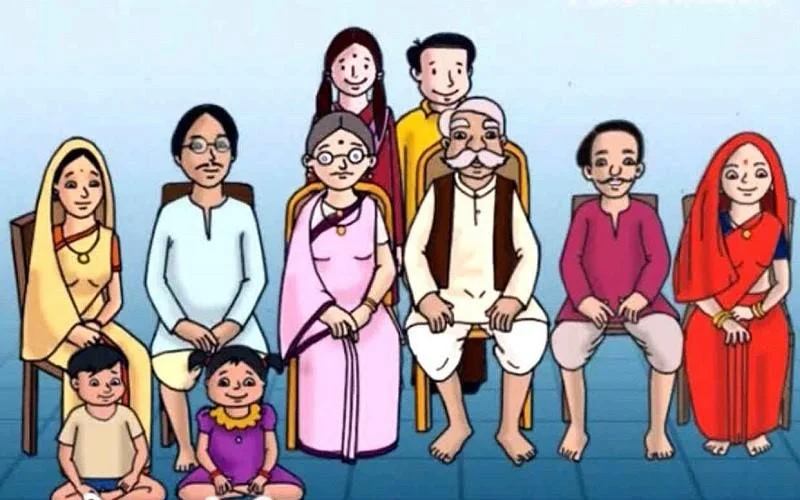
Joint Hindu Family Business – An Affectionate Business
INTRODUCTION:
The Joint Hindu Family Business is an affectionate business and a distinct form of organization peculiar to India. The operation of law creates a joint Hindu Family Business. It does not have any separate and distinct legal entity from that of its members.
The Joint Hindu Family business is controlled under the Hindu Law instead of the Partnership Act. The membership in this form of business organization can be acquired only by birth or by marriage to a male person who is already a member of the Joint Hindu Family. The head of joint hindu family is karta.
“When two or more families agree to live and work together, throw their resources and labor with joint-stock and share profits and the losses, then this family is known as composite family.”
There are two schools of Hindu Law-one is Dayabhaga, which is prevalent in Bengal and Assam, and the other is Mitakshara prevalent in the rest of the country. According to Mitakshara law, there is a son’s right by birth in the property of the joint family. It means, when a son is born in the family, he acquires an interest in the property jointly held by the family.
The business of the Joint Hindu Family is controlled and managed by one person who is called ‘Karta’ or ‘Manager.’ The Karta or manager works in consultation with other members of the family, but ultimately, he has the final say. The liability of Karta is unlimited, while the responsibility of other members is limited to their shares in the business.
When the family members run a business enterprise, and they run a business as a family business, then such a form of business organization is called Joint Hindu Family Business. It is also called a Hindu Undivided Family. Joint Hindu family conducts business inherited from it as per Hindu law.
AIMS AND OBJECTIVES:
The project aims to learn the benefits and functions of the Joint Hindu Family Business
Objectives of the study are
- To learn about what is joint Hindu family
- To learn about the problems in joint Hindu family
- To learn about the benefits of joint Hindu family
- To learn about the features of the joint Hindu family
METHOD AND METHODOLOGY:
In this project, we are going to learn about Joint Hindu Family Business
Primary data is data gathered for the first time by the researcher. It is the raw form of data and thoroughly studied and hence a helpful tool for secondary data. Here the method used for the collection of primary data is by using the reference to the website.
The referred websites in this project are used as a source of data for this project. Most of the content is collected from these websites. The authenticity of this information cannot be taken seriously, and thus, keeping that in mind, most of that data might be real or fake.
NEED AND IMPORTANCE:

Advantages of a Joint Hindu Family Business:
- Supportive in problems
- Festival enjoyments
- Mutual adjustment
- Helps to the better study of the children
- Understanding during marriages
- Minimum subsistence of the living
- Disciplines in a family
- Spirit of oneness

Disadvantages of a Joint Hindu Family Business:
- Misbehavior in the partners
- Exploitation of member
- Money value among members
- The burden in the joint family
- Inferiority complex
DETAIL REPORT OF PROJECT:
The Joint Hindu Family Business is a family business that involves only the members of the family.
Meaning: Joint Hindu Family Business is a different type of organization, which is found only in India. As the name suggests, it is the type of organization in which all the members of the Hindu Undivided Family manage and control the business with the direction of the head of the family. It is not a Partnership. It is just like a Partnership where only the members of the family can take part.
It is not even sole trading concern, but it is enlargement of sole trading concern in which continuity is guaranteed. The business is carried on from generation to generation. It comes into existence by the operation of Hindu law. It is the result of the Hindu Undivided Family system followed in India. Wherever there is a Hindu Undivided Family, there is the scope of Joint Hindu Family Business.
Joint Hindu Family Business, though it is an enlarged form of sole trading concern, it enjoys stability. It is given due recognition by the Income Tax Act, 1961, and by the Joint Hindu Succession Act, 1956, but it lacks legal status. Status of Joint Hindu Family firm and its members is the same.
Membership: The membership of the Joint Hindu Family Business is restricted only to members of the family. Members of the family are called ‘co-parceners.’ Before 1956, female members of the family were not having equal rights with male members, but the Hindu Succession Act, 1956, has its provisions for female members also. The head of the family controls the business called ‘Karta.’ Karta and co-parceners are usually male members.

Management: The management of Joint Hindu Family Business is in the hands of the head of the family, who is known as “Manager or Karta.” Karta has to carry on the business with care; he has to protect the interest of the members; he cannot make secret profits. Karta has full authority and control over the financial aspects of the business. He is called “Custodian of Property.”
He is fully responsible for business risk; his liability is unlimited. The responsibility of the co-parceners is limited. The co-parceners have to help Karta in doing the business. Any member is free to get separate from Joint Hindu Family Business. Generally, separation from the Joint Hindu Family is due to the disagreement with the Karta’s policies and programs.
Types of Joint Hindu Family Business: There are two types of Joint Hindu Family Businesses. They are as follows:-
(1) Mitakshara: Only male members born in the family are eligible to get an equal share in the property of the family. This system exists in India except for West Bengal and Assam.
(2) Dayabhagha: Under this, both male and female members get the share in the property of the family. This form exists in West Bengal and Assam. From June 22, 1994, the female members also have the co-coparcener right in the state of Maharashtra.
ANALYSIS OF DATA:
Features of Joint Hindu Family Business

- Formation: Joint Hindu Family cannot be formed or created by any contract or agreement because this organization came into existence by the operation of the “Hindu Law.” Any agreement like a partnership firm does not form it. Whenever there is a Hindu Undivided Family, there is the scope for Joint Hindu Family Business.
- Registration: It is not at all compulsory to register this organization because it is the result of Hindu Law.
- Membership: There are two types of members, i.e., Karta and Co-parceners. Karta is the older male member of the family who controls and manages the business. The other family members are called the co-parceners. There is no limit on membership because the membership is by birth.
- Management: The head of the family has full responsibility for the management of Joint Hindu Family Business. He is free to take any decision without any interference from any co-parceners, but he can seek advice and help from the family members.
- Liability: The liability of Karta is unlimited because he is the only deciding authority, whereas the responsibility of co-parceners is limited up to their share in the capital of the family.
- Sharing of Profits and Losses: According to the Hindu Succession Act, 1956, all the members of the Hindu Undivided Family have equal rights to share the profits as well as losses of the business.
- Legal Status: Any organization gets separate legal status only after its registration with appropriate authorities. In case of Joint Hindu Family firm registration is not at all compulsory; hence, it does not enjoy any legal status. Though Joint Hindu Family Business is enlarged form of sole trading concern and it has got due recognition by Income Tax Act, 1961, and Joint Hindu Succession Act, 1956, then also it does not enjoy separate legal status because of Joint Hindu Family firm and its members are the same that is inseparable.
- Partition: As Joint, Hindu Family Business is controlled by Karta, and co-parceners do not have the right to interfere in the decisions of Karta. But, as per Hindu Law, any member who is unsatisfied with the resolution of Karta can demand partition.
- Continuity and Stability: This organization enjoys a long and stable life as it is not affected due to death, insolvency, the insanity of any of its members. In other words, if Karta dies or becomes incapable of managing the business, then the succeeding co-parceners will act as Karta.
- Conduct of Business: A senior member of the family generally runs a Joint Hindu Family business called Karta or the Manager, and he had the full authority to conduct the business activities and business operations.
- Rights of Karta: The Karta can give receipts, make contracts, and draw bills, but he cannot give up debts already due to the Joint Hindu Family Business. He had the authority to sell or mortgages the property of the Joint Hindu Family while conducting the business of the firm.
- Dissolution: If the family business becomes insolvent, the adult co-parceners and the manager will be adjudged bankrupt, although their share in the family property can be used to pay off the debts of the Joint Hindu Family Business.
- Flexibility: There is a great deal of flexibility in business operation. The Karta can expand or change the line of business, or he can even close down the business. The co-parceners usually agree with the decisions taken by Karta in the conduct of business.
- Business Secrecy: There is a great deal of business secrecy in this organization. The business secrets are known to co-parceners in general and Karta in particular. It is not obligatory for them to publish their accounts, which results in a great deal of privacy and secrecy.
- Credit Standing: This type of business enjoys higher credit in the market, mainly because of unlimited liability on Karta. As a result of this, he does business on better terms. He also gets liberal financial facilities from banks and others. Better credit standing in the market increases the competitive strength of this business.
CONCLUSION:
The family enterprise continues to be an essential element of the world economy and a location for understanding conflict in family relationships internationally. Managing conflict effectively in the process of succession is crucial to preserving the impact family enterprise has on our economy and families themselves. Therefore, whether the family business is based in the United States or across the world, one needs to be aware of the five points in which conflict is most likely to occur:
- The mutual acceptance of roles
- The agreement to continue the business
- The propensity of a successor to take over
- The tendency of an incumbent to step aside
Succession planning because the conflict in family succession is universal.
DISCUSSION:
For people living in a joint family, how do you manage your finances when all members are earning?
Paranal Sontakke says, and I quote, “I Belong to a joint family. It is one of the best things that could ever happen that a healthy and joyous atmosphere keeps everyone fresh and active. Now coming to the question, guys, it’s all about mutual understanding and not getting affected by negatives from outside the world.
- Its already decided or automatically understood by earners in the family where one will invest money.
- There are no ego issues.
- It’s OK, even if more money is going from one pocket.
- E.g., suppose one person gives money for daily primary uses.
Another person brings all necessities (oil cane, wheat, rice… - One invests in property, insurance, external deals.
Other with issues like automobiles at home, electric equipment such as mobile, mixer, TV, ac,…
Its an endless list, but love for each other, cooperation, selflessness, affection, being with each other no matter what situations come.
Not to forget sharing each other clothes and shoes, saree’s, dresses are all fun.
It’s an endless list.”
SUGGESTION:
According to my point of view, a joint family is suitable for all. Because the joint family has the old members, who are well experienced to run a family and active earning group of people and their children. The children can grow up by the grandparents who make them culturally right. There is no feeling of loneliness in the family. All can adjust and go running an excellent joint family.
The grandparents know more about the family and disease; they will care for their grandchild. There is help from all the sides. The joint family gives a name to the family. They should be proud of that. The problems in the family can be easily solved in the case of a joint family. Though there is happiness in a single-family, it is not constant when there is a slight misunderstanding for which there are no people to correct them. So a joint family is the best.
ACKNOWLEDGMENT:
My profound gratitude to all the faculty members of the Department, for their timely assistance and encouragement throughout my research work.
I duly acknowledge the encouragement and support of the research scholars in the department, and all my colleagues and friends.
It gives me immense pleasure to take the opportunity to all the people who are directly or indirectly involved in the completion of my project based on Joint Hindu Family – An affectionate Business
With deep reverence, I offer my deepest gratitude _____, without whom this project could not have been fulfilled.
Lastly, I thank Almighty, my parents, family members, friends, and teachers for their constant encouragement and support, without which this project would not be possible.
Name of School/College
BIBLIOGRAPHY / REFERENCE:
- http://www.indiastudychannel.com/resources/124903-Features-Joint-Hindu-Family-Business.aspx
- https://www.iaspaper.net/joint-family/
- http://www.businessmanagementideas.com/organisation/types/hindu-undivided-family/joint-hindu-family-business-meaning-characteristics-and-advantages/8904
- http://family.jrank.org/pages/513/Family-Business-Conclusion.html
- https://www.quora.com/For-people-living-in-a-joint-family-how-do-you-manage-your-finances-when-all-members-are-earning
In order to download the PDF, You must follow on Youtube. Once done, Click on Submit
Follow On YoutubeSubscribed? Click on Confirm
Download Joint Hindu Family Business – An Affectionate Business PDF







Very nice information
Amazing information